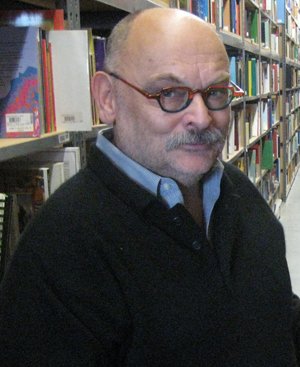Few independent bookstores are more iconic than Powell's Books. Even readers who've never been to Portland, Oregon, know about the store from its ads in places like the New Yorker, or from its prominent online presence, or from its reputation as the largest new- and used-book store in the world. The "City of Books," as the four-story flagship store on West Burnside is known, occupies an entire city block, and carries more than one million books. The sixty-eight-thousand-square-foot space is divided into nine color-coded rooms, which together house more than 3,500 sections. From the moment you walk in, it feels as if you could find anything there. (And if you can't, try one of the seven branch stores in five other locations throughout Portland, specializing in everything from technical books to home and garden.)

I was early for my interview with owner Michael Powell, so I decided to get a coffee in the attached café. Like the bookstore itself, the guiding aesthetic is simplicity—no overstuffed chairs, no fireplace, no decorations on the salmon-colored walls other than some taped-up flyers for local bands and a Buddhist meditation group. Not that anyone seems to notice. While I was there, every single person I encountered was reading. At the table nearest me a high school girl in cat-eye glasses and a ski cap read Lucy Knisley's French Milk (Epigraph Publishing, 2000), with a stack of David Sedaris waiting at her elbow. A well-dressed elderly woman flipped through the Oregonian not too far away. And on the other side, near the windows, a young woman with black hair and piercings through both her cheeks was making a list of recipes from The Garden of Vegan (Arsenal Pulp Press, 2003). Filling the rest of the tables were hipsters in zip-up sweatshirts and Chuck Taylor All Stars, a young father in a shirt and tie with his two children, construction workers wearing Carhartt overalls, and women with trendy bags and knee-high leather boots. All were reading. Here was a microcosm of the store: A diversity of people and interests, sure, but what's most important in Powell's is neither image nor decor but the books themselves.
This is not to say that the store doesn't have a unique vibe. Like Michael Powell himself, there is a straightforwardness to Powell's that puts a person at ease. When the owner and I met, he was dressed casually in jeans and a pullover sweater. And though he had to attend a black-tie community event later that night, he was generous with his time, walking me through both the history of the business and the store itself—how the portion of the building with terrazzo floors had originally been an American Motors dealership; how when they built the newer sections of the store, more than a decade ago, they'd intentionally left the concrete floors bare because the industrial feel not only complemented the plain, pine bookcases but also added to the laid-back atmosphere; and how proud he is that their foreign-language section alone accommodates more than thirty thousand titles.
Michael Powell's philosophy on bookselling is simple: He wants to provide people with books. He has no interest in telling people what to read. Nor would he ever judge a person by the type of books she purchases. New or used, dime-store paperback or first-edition hardcover, manga or metaphysics, all are equally at home on his shelves.
This sense of equality permeates every aspect of the Powell's business model, from the practice of shelving used and new books side by side in each section, to the store's long-standing advocacy on free-speech issues, to the fact that its five hundred employees are unionized and have a matching 401(k) plan. Likewise, Powell may be the boss, but it's clear that he also sees himself as a fellow employee. When we left the downtown location and he drove me across town to the former ball-bearing warehouse that is now the site of the online bookselling operations, no one had to "look busy" when the owner arrived. Instead, they chatted with him as we walked through the facility, offering updates on their various ongoing projects, including ideas for how best to recycle used packaging materials. The warehouse, which feels like an airplane hangar but with the sound of jazz floating in the air, processes up to three thousand online orders daily. And 70 percent of those are single-title orders, a fact that amazes Powell, a logical man who never ceases to be surprised or impressed by his customers, even when they pay more than twenty dollars to have a four- dollar book shipped overnight. It makes him wonder aloud how he can better meet their needs.
This, then, might be the trait that best characterizes Michael Powell: curiosity. He is endlessly curious about the world, about his employees' ideas, about what his customers want to read, and about innovative ways to do business. It is a trait that has served him well during his last four decades of bookselling. And though he'll officially hand over the reins of the business to his daughter, Emily, in July, when he turns seventy, one gets the sense that Powell will always be dreaming of how to connect books and people. Because it's clear that he loves them both.
How did you become a bookseller?
In the mid-sixties I ran a little student co-op [at the University of Chicago] where students could sell textbooks and other books on consignment. I also rode my bike around to various thrift shops in the general area and went to the Sunday morning flea market called Maxwell Street—which was very famous in its day in Chicago—to buy books and put them on consignment. Then I sold books by catalogue for a couple years to university libraries, mostly out-of-print social science and history, before I opened my first store in 1970, in Chicago.
Early on, I was thinking of opening a store in Santa Fe, New Mexico, because my wife and I had traveled to Santa Fe and saw it for the first time and everybody falls in love with Santa Fe the first time. She was being offered a job as a Montessori teacher there and I was going to open a bookstore when I got a phone call from a mentor in Hyde Park, in Chicago. He wanted to move his store because he'd been attacked by a customer.
He'd found a new location that was closer to campus, and the reason it was currently vacant was that the Weathermen had firebombed its previous occupant out of existence and he didn't want to go back into it, he was too nervous. And the university—well, not exactly the university, but whoever was in charge of organizing these things—had approached my friend. However, the space was too big for him; he wanted to take only half of it. So he said to me, "You take half and do mostly paperbacks, and I'll do hardbacks." And I said, "I could do that, but I don't have the money." My wife says I was always good for twenty bucks but never for a hundred. And he said, "There are some professors who would like to talk to you about that; they're kind of the patron saints of bookstores." There were three of them: Morris Janowitz, Edward Shils, and the third one was Saul Bellow. Morris Janowitz, who was the lead, came to me and said, "What would you need?" I had no idea. So I said—and this is, remember, 1970—I said, "Probably three thousand dollars." And he said, "We can do that. We can loan you three thousand dollars." Then I said, "But, you know, I've got a problem. I don't know how quickly this will get up and running. And there's all the rent." So he said, "We can help with rent, too, for a little while." Rent was, I think, a hundred dollars a month. So, okay, now they're rehabbing the building and there's some time before I can occupy it. So my wife and I take a thousand of the three thousand and we travel across the country to Oregon to visit my folks. [Laughter.]
When we were back in Chicago, I took the remaining two thousand dollars and bought some books. A friend and I built some shelves, and we opened. Like I was saying, it was a small, small store. But we did well. The students, of course, liked used paperbacks. They thought that was great. At some point my neighbor moved away and I took his space. Then there was another business in the back...and when they went away I took that space. So, ultimately, it was about four thousand square feet.
And then my dad [who had come to Chicago to work in the bookstore] went back to Portland in 1971. He opened his shop, moved once into a space of about ten thousand square feet, and had begun to introduce new books into the mix, shelving them side by side with used books. In 1979 he said, "You know, now wouldn't be a bad time if you're interested in coming back." I always thought I would come back. I always thought of myself as an Oregonian, always kept my Oregon driver's license. And I said, "Yeah, I'd like to do that." There had been a huge snowstorm in Chicago that winter; we'd had an infant—she was born in November—and we had to get out of the neighborhood we were in. It wasn't suitable for raising a family, and I'd had it with the weather. So coming back to Oregon sounded great to me.
Well, the night before we left Chicago, my dad called. He said, "I've got some news: We've lost our lease." Our landlord, which was a brewery, had wanted to take the space back and had given us a year to find a new location. So we spent that year searching, and we found the space that is currently Powell's Books. In the mid-eighties, we started opening branch stores. I was always curious about new ways to do things with books; I didn't want just to replicate anything. And one of the questions was if we could do our new-used mix and do it in the suburbs, where everybody's perception was that it would have to be Borders or Barnes & Noble or something.








